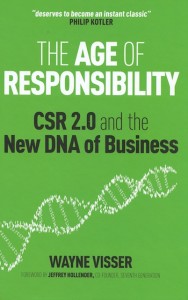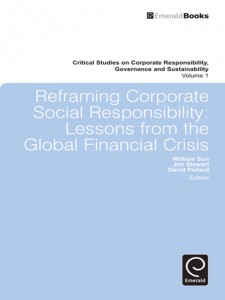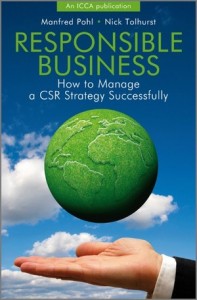The Ages and Stages of CSR:
Towards the Future with CSR 2.0
Paper by Wayne Visser
Abstract
This article argues that CSR, as a business, governance and ethics system, has failed. This assumes that success or failure is measured in terms of the net impact (positive or negative) of business on society and the environment. Hence, we need a different kind of CSR if we are to reverse the current direction of many of the world’s most pressing social, environmental and ethical trends. The article reviews business’s historical progress over the Ages and Stages of CSR: moving through the Ages of Greed, Philanthropy, Marketing and Management, using defensive, charitable, promotional and strategic CSR approaches respectively. It then examines the Three Curses of CSR 1.0 (incremental, peripheral and uneconomic), before exploring what CSR might look like in an emerging Age of Responsibility. This new CSR – called systemic or radical CSR, or CSR 2.0 – is based on five principles (creativity, scalability, responsiveness, glocality and circularity) and forms the basis for a new DNA model of responsible business, built around the four elements of value creation, good governance, societal contribution and environmental integrity.
If CSR is the answer, what is the question?
First let me say what I understand by CSR. I take CSR to stand for Corporate Sustainability and Responsibility, rather than Corporate Social Responsibility, but feel free use whichever proxy label you are most comfortable with. My definition is as follows: CSR is the way in which business consistently creates shared value in society through economic development, good governance, stakeholder responsiveness and environmental improvement. Put another way, CSR is an integrated, systemic approach by business that builds, rather than erodes or destroys, economic, social, human and natural capital.
Given this understanding, my usual starting point for any discussion on CSR is to argue that it has failed. I provide the data and arguments to back up this audacious claim in my new book, The Age of Responsibility, but the logic is simple and compelling. A doctor judges his/her success by whether the patient is getting better (healthier) or worse (sicker). Similarly, we should judge the success of CSR by whether our communities and ecosystems are getting better or worse. And while at the micro level – in terms of specific CSR projects and practices – we can show many improvements, at the macro level almost every indicator of our social, environmental and ethical health is in decline.
I am not alone in my assessment. Indeed, Paul Hawken stated in The Ecology of Commerce in 1993 that ‘If every company on the planet were to adopt the best environmental practice of the ‘‘leading’’ companies, the world would still be moving toward sure degradation and collapse.’ Unfortunately, this is still true nearly 20 years later. Jeffrey Hollender, co-founder and former CEO of Seventh Generation, agrees, saying: ‘I believe that the vast majority of companies fail to be ‘‘good’’ corporate citizens, Seventh Generation included. Most sustainability and corporate responsibility programs are about being less bad rather than good. They are about selective and compartmentalized ‘‘programs’’ rather than holistic and systemic change’ …
Continue reading
[button size=”small” color=”blue” style=”download” new_window=”false” link=”http://www.waynevisser.com/wp-content/uploads/2012/05/paper_ages_stages_csr_wvisser.pdf”]Pdf[/button] The Ages & Stages of CSR (paper)
Related pages
[button size=”small” color=”blue” style=”info” new_window=”false” link=”http://www.waynevisser.com/books/the-age-of-responsibility”]Page[/button] The Age of Responsibility (book)
[button size=”small” color=”blue” style=”tick” new_window=”false” link=”http://www.csrinternational.org”]Link[/button] CSR International (website)
Cite this article
Visser, W. (2011) The Ages and Stages of CSR: Towards the Future with CSR 2.0, CSR International Paper Series, No. 3. First published in Social Space 2011.




 If we expect the right to fair treatment, we have a responsibility to respect the rule of law and honour the principle of reciprocity. If we believe in the right to have our basic needs met, we have the responsibility to respond when poverty denies those rights to others.
If we expect the right to fair treatment, we have a responsibility to respect the rule of law and honour the principle of reciprocity. If we believe in the right to have our basic needs met, we have the responsibility to respond when poverty denies those rights to others.

